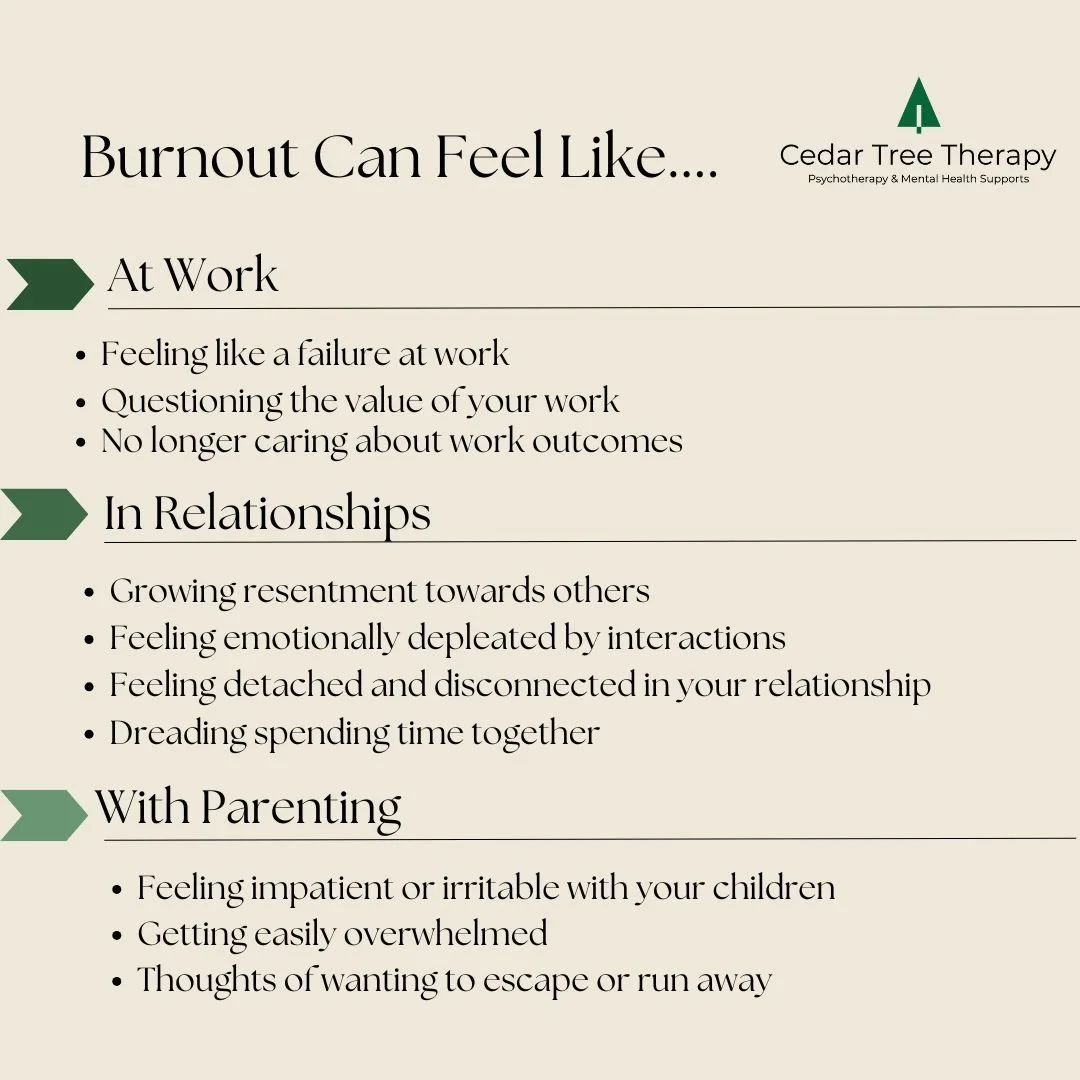Burnout is not just another name for feeling stressed. Burnout is a state of emotional, physical, and mental exhaustion caused by prolonged and excessive stress. It can manifest as feelings of cynicism, detachment, and a sense of ineffectiveness in one’s personal and/or professional life. While it has been commonly associated with work-related stress, burnout can also occur due to other areas of life that demand too much from a person without enough recovery time.
Signs and Symptoms of Burnout
Understanding the signs of burnout is crucial for addressing it effectively. Common symptoms include:
Chronic fatigue and exhaustion, never feeling rested
Insomnia or difficulty sleeping, not being able to rest or relax
Increased irritability or anxiety
A sense of helplessness and hopelessness, feeling detached and not present
Decreased life satisfaction and engagement
Physical symptoms like headaches, stomach aches
Recognizing these signs early can prevent further complications and aid in a quicker recovery. These signs are our body’s way of telling us that something is not working. The earlier we can listen to these symptoms rather than pushing them away, the better.
The Role of Therapy in Treating Burnout
Therapy can be a vital resource for individuals experiencing burnout. Here are several ways therapy can help:
1. Identifying Causes
A therapist can assist in unraveling the underlying causes of burnout. Whether it stems from workplace pressures, personal expectations, or life changes, understanding the root of the issue is the first step toward resolution. One of the most valuable contributions from therapy is learning why you make the choices that you do, why you act or behave in a certain way.
2. Developing Coping Strategies
Therapists offer valuable tools and coping strategies tailored to an individual’s unique circumstances. Techniques such as cognitive behavioural therapy (CBT) can help reframe negative thought patterns and promote healthier responses to stress. Regaining a sense of personal identity and taking back control and agency in the person’s life are also crucial areas of therapy interventions for burnout.
3. Enhancing Resilience
Therapy can facilitate the development of resilience, enabling individuals to bounce back from stressors more effectively. This might include building self-compassion, practicing mindfulness, or improving emotional regulation.
4. Setting Boundaries
One of the hallmarks of burnout is the lack of boundaries, leading to overcommitment and exhaustion. Therapists can guide clients in setting and maintaining healthy boundaries, which is essential in creating a more balanced life.
5. Fostering Self-Care
Therapists emphasize the importance of self-care as a key component in combating burnout. This includes not just physical care, like exercise and nutrition, but also emotional and mental care, such as taking time for hobbies and social connections.
Recovering from Burnout
Recovering from burnout is often a gradual process that requires patience and commitment. It can take weeks, months or years. Therapy provides a supportive, non judgemental, unbiased environment where individuals can explore their feelings, learn to manage stress differently, and develop sustainable habits that can lead to a more fulfilling life.
As individuals begin to integrate the coping strategies learned in therapy, they may find themselves returning to a state of balance where they can engage more positively with work and personal commitments. Additionally, ongoing support from a therapist can provide encouragement and accountability in maintaining these changes.
Burnout is a pervasive issue that can significantly impact one’s quality of life. If you recognize the signs of burnout in yourself or someone you know, seeking the guidance of a qualified therapist can be an instrumental step toward recovery and lasting well-being. Prioritizing mental health is not just beneficial; it is essential for create a life that aligns with your values and that you want to be present in.
About The author
Dana Etherington is an Occupational Therapist, Psychotherapist and the owner of Cedar Tree Therapy, a psychotherapy practice located in Brooklin, Ontario. Dana uses evidence based treatment modalities to treat anxiety, obsessive compulsive disorder (OCD), disordered eating and complex family relationships.





